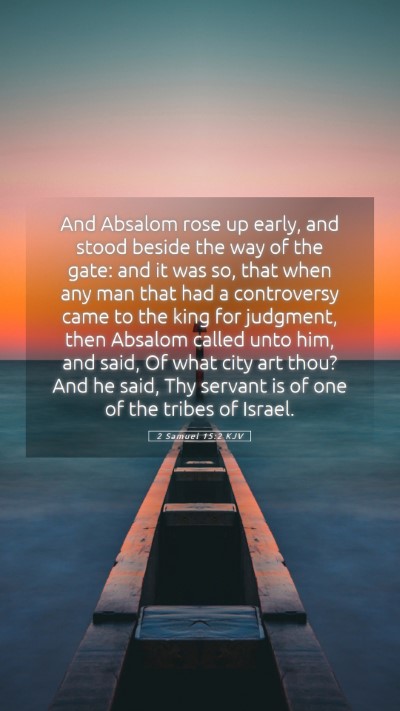Understanding 2 Samuel 15:2
Bible Verse: 2 Samuel 15:2 - "And Absalom rose up early, and stood beside the way of the gate: and it was so, that when any man that had a controversy came to the king for judgment, then Absalom called unto him, and said, Of what city art thou? And he said, Thy servant is of one of the tribes of Israel."
This verse portrays the beginning of Absalom's conspiracy against his father, King David. It highlights a significant moment in Absalom's rise to power and the political dynamics at play in the kingdom of Israel.
Commentary Insights
Insights from respected biblical commentators provide a rich understanding of this passage.
-
Matthew Henry's Commentary:
Matthew Henry notes that Absalom's actions reflect a calculated approach to gain the favor of the people. By positioning himself at the gate, he made himself an accessible figure to those seeking justice, insinuating himself as a potential alternative to David. His question about the city was a way to establish a connection, making each person feel valued and understood.
-
Albert Barnes' Notes:
Albert Barnes emphasizes the strategic nature of Absalom's behavior. By taking the initiative to greet petitioners and inquiring about their backgrounds, Absalom fosters a false sense of community. Barnes suggests that this was a method to instill loyalty and create a faction against David, reflecting how personal charisma can sway public opinion and incite rebellion.
-
Adam Clarke's Commentary:
Adam Clarke provides further context on the significance of gates in ancient cities, where legal judgments were often rendered. Absalom's decision to intercept those seeking judgment indicates a clear intent to undermine King David's authority. Clarke sees this as indicative of a larger trend of discontent among the people, which Absalom seeks to exploit for his gain.
Bible Verse Meanings and Interpretations
The actions of Absalom in this verse symbolize the themes of ambition and betrayal. He positioned himself as a savior for the people, which is essential in understanding the complexities of his character and the political environment of the time. This passage serves as a warning about the nature of leadership and the vulnerability of those in power.
Historical Context
To fully grasp the meaning of this verse, we must consider the historical background of Absalom's revolt. During this time, King David was facing various challenges, including family turmoil and national strife. Absalom's actions were not only personal but also deeply political, as they levered existing grievances among the populace.
Application to Daily Life
When studying this scripture, we can reflect on the nature of our own relationships and ambitions. Absalom's manipulative tactics remind us of the importance of genuine leadership and the potential consequences of seeking power for selfish reasons. In modern contexts, this passage can provoke discussions regarding ethics in leadership and community service.
Related Bible Verses
- 2 Samuel 14:30 - Understanding Absalom’s motivations and background.
- 1 Kings 1:5 - Another account of Absalom's rebellious nature.
- Psalm 3:1 - A heartfelt cry of David concerning Absalom’s revolt.
Conclusion
2 Samuel 15:2 serves as a pivotal moment in the narrative of Absalom's rebellion. This verse has profound implications for understanding leadership, fidelity, and the darker motivations of the human heart, which remain relevant in our lives today.
In summary, the collective insights from Matthew Henry, Albert Barnes, and Adam Clarke reinforce the importance of this verse in the broader context of biblical studies. Through this commentary, we gain valuable Bible verse explanations, promote Bible study insights, and enhance our understanding of Scripture.


